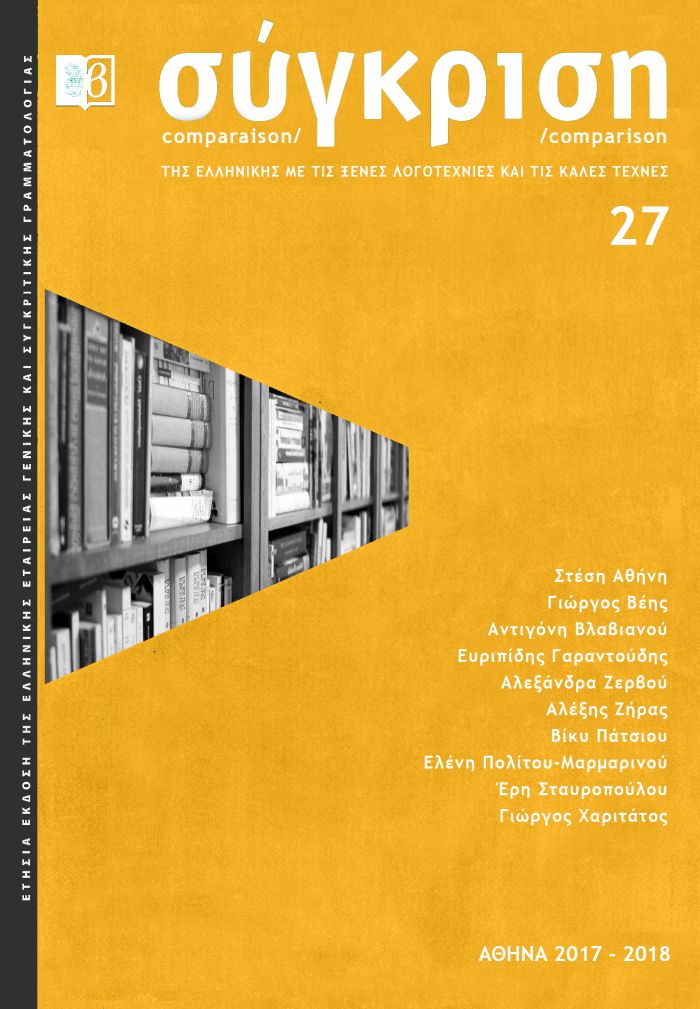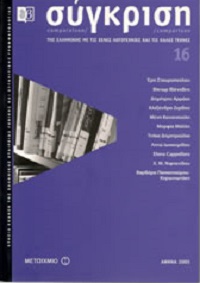The management of historicity and the formation of national identity for young adults. The little heroine(s) of Galateia Kazantzaki, J.-P. Stahl and Maria Vilinska
Abstract
In 2013 the centenary of the union Crete with Greece was celebrated. On the occasion of the anniversary Galateia Kazantzakis’ novel A Little Heroine (1951) which refers to the massacre in the Arkadi Monastery, was studied in many schools. Today’s reading in school was used to cultivate historical knowledge and cultural consciousness. However, the intentions of the author were wider, as the work is not without a disguised spirit of cosmopolitanism. Through the story of the Cretan girl, Lenio, the events are described with relative historical accuracy, interwoven with interesting facets of Cretan folklore. Fragments of this children’s novel are incorporated to the dramatic play of Galateia Kazantzaki, To Arkadi.
Although it is not declared anywhere, the novel of Galateia Kazantzaki is anything but original. It cleaves faithfully to and often paraphrases the story of J.-P. Stahl’s little heroine, Maroussia (1879), an Ukrainian girl who is not afraid of the Russian conquerors of her homeland. The Greek author uses the translation of Panayotis Ferbos written in an elegant katharevousa. The book of Stahl had been sent to the pupils of Alsace at the time the province was under German occupation. Thus, it proposes a skillful and allusive management of the historical material endeavouring to cultivate a “by analogy” love of fatherland and to create a French national consciousness, without speaking explicitly about this. The high renowned French author and famous publisher of the works of Jules Verne, was fully aware of how to bypass political censorship.
However, the French work too is not original. It is a version of the homonymous novel (Marysia) by the Russian-Ukrainian literary figure Maria VilinskaMarkovytch (1872).
The spatial-temporal transformations of these texts, as well as their characteristic differentiations, are particularly fascinating. The corresponding heroine is modelled differently by the left-wing feminist Galateia Kazantzaki, the French moderate socialist J.-P. Stahl and the militant Ukrainian (female) author committed to his homeland’s struggle for liberation. Indeed, because these books are published also today, they are illustrated and perceived in different ways. In my paper I try to follow the journey of the young heroine in space and time, and to detect the way in which the game of reception and (re)creation is played.
Article Details
- How to Cite
-
Ζερβού Α. (2019). The management of historicity and the formation of national identity for young adults. The little heroine(s) of Galateia Kazantzaki, J.-P. Stahl and Maria Vilinska. Comparison, 27, 60–97. https://doi.org/10.12681/comparison.19542
- Issue
- Vol. 27 (2018)
- Section
- Articles

This work is licensed under a Creative Commons Attribution-NonCommercial-ShareAlike 4.0 International License.
Authors who publish with this journal agree to the following terms:
- Authors retain copyright and grant the journal right of first publication with the work simultaneously licensed under a Creative Commons Attribution Non-Commercial License that allows others to share the work with an acknowledgement of the work's authorship and initial publication in this journal.
- Authors are able to enter into separate, additional contractual arrangements for the non-exclusive distribution of the journal's published version of the work (e.g. post it to an institutional repository or publish it in a book), with an acknowledgement of its initial publication in this journal.
- Authors are permitted and encouraged to post their work online (preferably in institutional repositories or on their website) prior to and during the submission process, as it can lead to productive exchanges, as well as earlier and greater citation of published work (See The Effect of Open Access).





